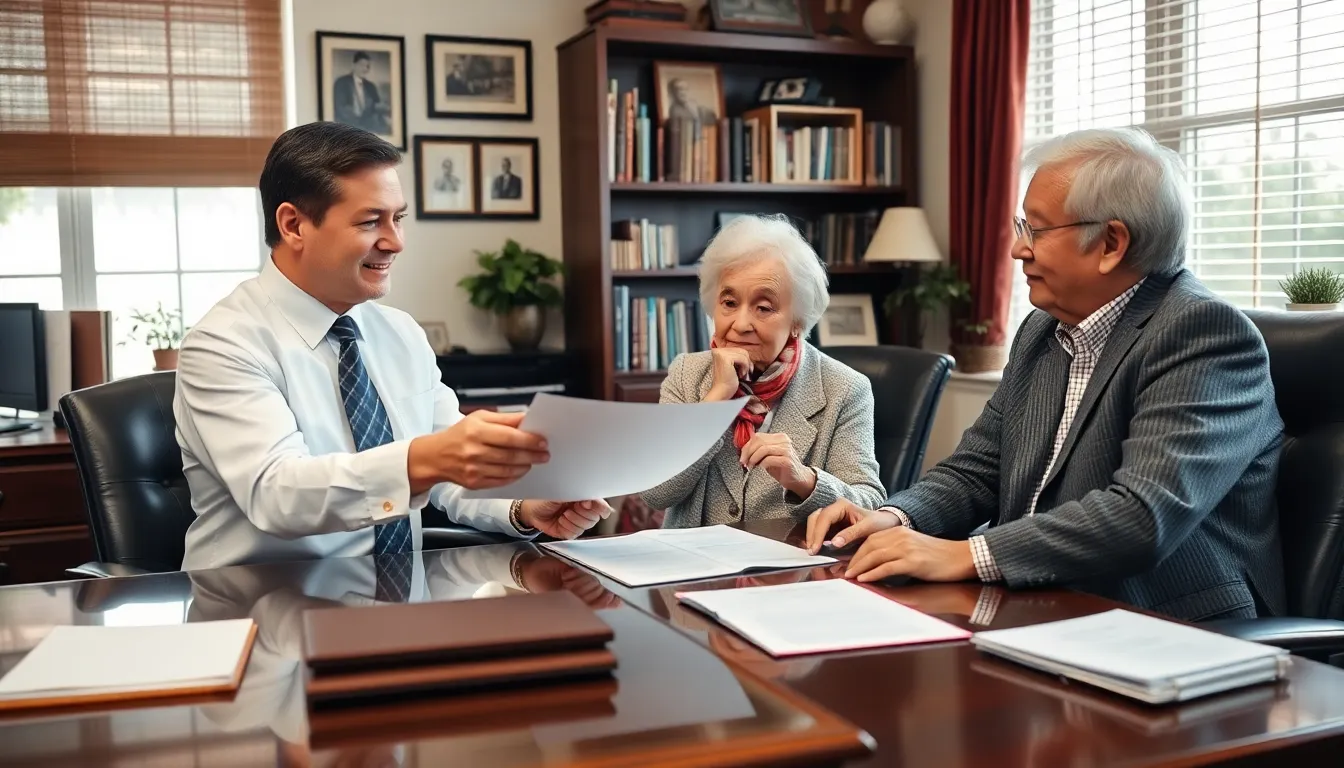As we approach 2025, the topic of the lifetime gift tax exemption is heating up faster than a summer sidewalk. This financial gem allows individuals to gift a certain amount without Uncle Sam peeking over their shoulders for a slice of the pie. But what happens when the exemption changes?
Table of Contents
ToggleOverview of the 2025 Lifetime Gift Tax Exemption
The 2025 lifetime gift tax exemption allows individuals to give a specified amount without triggering federal gift tax. Set at approximately $12.92 million per individual, this exemption applies to gifts made during a person’s lifetime. This threshold can significantly reduce taxable estate values upon death.
Planning for gifting strategically can enhance wealth transfer while minimizing tax liabilities. Annual exclusion gifts, up to $17,000 per recipient for 2023, allow individuals to exclude certain gifts from taxable totals. Utilizing this strategy enables individuals to make substantial gifts without impacting their lifetime exemption.
Regulations may change in the future, so staying informed about potential adjustments is crucial. Gift values that exceed the exemption may incur federal gift tax rates, which can reach up to 40%. Individuals should document gifts accurately for compliance and reporting purposes.
In 2025, individuals may observe the exemption revert to $5 million, adjusted for inflation since 2010. Such changes could influence estate planning strategies for many individuals, especially those considering large gifts in the years leading up to 2025.
Advisors recommend reviewing one’s financial situation and consulting with tax professionals to adjust gifting strategies accordingly. Individuals can maximize benefits by being proactive and informed about their options before potential modifications to the exemption occur.
Key Changes in the 2025 Tax Law

The 2025 tax law introduces significant changes to the lifetime gift tax exemption. Individuals must prepare for the new exemption limits that will impact gifting strategies.
New Exemption Limits
Starting in 2025, the lifetime gift tax exemption will likely revert to approximately $5 million per individual, adjusted for inflation since 2010. This reduction represents a considerable decrease from the current level of $12.92 million per individual. Wealth transfer opportunities may face limitations, emphasizing the need for strategic gifting before the change occurs. Individuals should explore gift strategies to take advantage of the higher exemption before it decreases.
Adjustments for Inflation
Inflation adjustments play a crucial role in determining the future landscape of the lifetime gift tax exemption. As inflation impacts dollar values, projected adjustments will ensure the $5 million limit keeps pace with economic changes. For example, if inflation rates remain steady, individuals may still find some relief through annual exclusion gifts, currently set at $17,000 per recipient in 2023. Planning charitable contributions could also supplement flexibility under new limits. Staying informed on inflation trends can help individuals navigate potential future tax implications successfully.
Implications for Donors
Understanding the implications of the 2025 lifetime gift tax exemption is crucial for current and future donors. It affects both gifting strategies and tax planning significantly.
Strategies for Effective Gifting
Effective gifting requires strategic planning to maximize the current exemption. Donors can utilize annual exclusion gifts, allowing them to give up to $17,000 per recipient in 2023 without incurring taxes. Considering larger gifts now might enhance wealth transfer before the exemption decreases. Another approach involves funding 529 college savings plans, which also fall under tax-exempt gifts. Charitable contributions not only support worthy causes but can reduce the taxable estate. Utilizing trusts for gifting can safeguard assets while benefiting recipients. Such strategies ensure that individuals optimize their giving while adhering to existing tax regulations.
Potential Tax Savings
Individuals can realize significant tax savings through mindful gifting strategies. Leveraging the current exemption of approximately $12.92 million allows for substantial wealth transfer without immediate tax consequences. If donors act before any changes in legislation take effect, they may preserve wealth for their heirs. Additionally, the combined approach of annual exclusion gifts and lifetime exemptions amplifies tax efficiency. Charitable contributions offer another layer of tax benefits, often resulting in deductions that reduce taxable income. Staying ahead of potential changes helps donors maximize their gifting while minimizing tax liabilities effectively.
Impact on Beneficiaries
Beneficiaries face significant implications from changes to the lifetime gift tax exemption in 2025. Understanding these impacts helps navigate estate planning effectively.
Gift Tax vs. Inheritance Tax
Gift tax applies to transfers made during a person’s lifetime, while inheritance tax pertains to transfers occurring after death. The lifetime gift tax exemption allows individuals to give substantial gifts without incurring federal taxes. Currently set at approximately $12.92 million, this exemption can significantly minimize estate tax burdens for heirs. Any gifts exceeding the exemption may incur taxes, potentially affecting the overall inheritance received by beneficiaries. Awareness of these distinctions ensures beneficiaries and donors manage their financial circumstances wisely.
Planning for Future Financial Needs
Beneficiaries benefit from careful planning regarding future financial needs. Anticipating potential tax liabilities enables careful evaluation of various gifting strategies. Utilizing the current exemption allows individuals to secure wealth for beneficiaries while minimizing estate taxes. Individuals often consider annual exclusion gifts as effective strategies for transferring wealth without immediate tax consequences. Strategic use of 529 college savings plans and charitable contributions further enhances financial security for heirs. Exploring these options now maximizes potential benefits before adjustments to the exemption impact future gifting capabilities.
As the 2025 lifetime gift tax exemption approaches, individuals face a critical opportunity to optimize their gifting strategies. With the current exemption significantly higher than what may come, proactive planning is essential. By understanding the nuances of the exemption and considering strategies like annual exclusion gifts and charitable contributions, individuals can effectively minimize tax liabilities and preserve wealth for future generations.
Staying informed about potential changes and consulting with tax professionals can help navigate the evolving landscape of estate planning. By acting now, donors can maximize their current benefits and ensure a smoother financial transition for their heirs.

